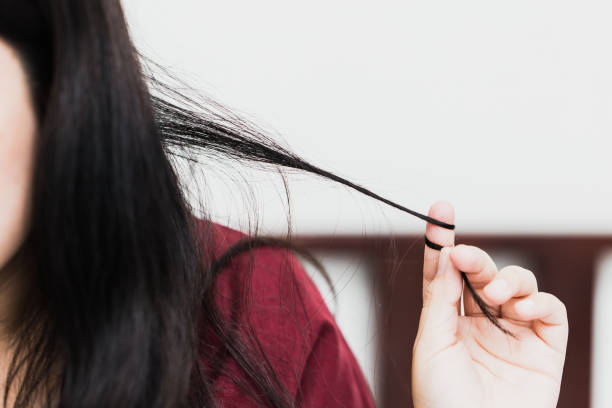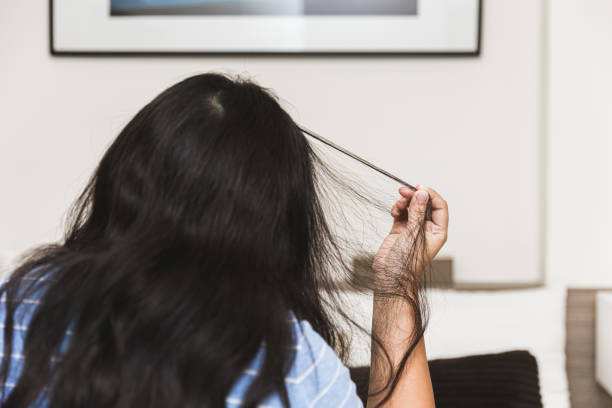Trichotillomania: Is There a Treatment?

Trichotillomania: Is There a Treatment?
Trichotillomania, medically known as “trichotillomania,” is a psychological disorder that compels the affected person to compulsively pull out their hair, whether from the scalp, eyelashes, eyebrows, or even other areas of the body.

This behavior can cause noticeable hair loss and the appearance of bald patches, leading to feelings of shame or embarrassment, and significantly impacting the affected person’s quality of life.
At Nera Med, we understand that trichotillomania is not just a bad habit but a disorder that deserves comprehensive understanding and treatment. Therefore, in this article, we provide a thorough overview of its causes and symptoms and discuss the modern treatment options available.
Also learn about How many hairs fall out daily?
What is Trichotillomania?
Trichotillomania is a psychological disorder classified under impulse control disorders. It often begins in childhood or adolescence and sometimes continues into adulthood.

The affected person feels an urgent urge to pull out their hair, preceded by a state of tension and followed by a temporary feeling of relief or satisfaction.
Causes of Trichotillomania
There is no single clear cause for this disorder; rather, several factors overlap, including:
Neurological factors: some researchers link this behavior to imbalances in brain chemistry, particularly in serotonin and dopamine levels.
Psychological factors: such as stress, anxiety, depression, or traumatic childhood experiences.
Genetic factors: studies suggest the possibility of a hereditary component in some cases.
Visit our website
Symptoms of TrichotillomaniaThe most prominent symptoms include:
Social impacts such as avoiding interactions with others or feeling embarrassed about one’s appearance.
Repeated hair pulling leading to noticeable hair loss in specific areas.
Frequent unsuccessful attempts to stop the behavior.
Feeling tension before pulling and temporary relief afterward.

How is the condition diagnosed?
Diagnosis is usually made by a psychiatrist or behavioral specialist and relies on clinical interviews and the exclusion of other dermatological causes of hair loss. At Nera Med, we use advanced psychological assessment tools to determine the severity of the condition and develop an appropriate treatment plan.
Also learn about Tips for Travelers Seeking Cosmetic Surgery in Turkey
Is There a Treatment for Trichotillomania?
Yes, there are several effective treatment options, including:
Cosmetic Interventions:
Some patients wish to restore their hair’s appearance, and at Nera Med, we offer specialized consultations on hair transplantation after recovery or cessation of the disorder.
Cognitive Behavioral Therapy (CBT):
Considered one of the most successful approaches, it helps the patient understand the motivations behind the behavior and learn alternative strategies to cope with stress.
Habit Reversal Training (HRT):
A core component of behavioral therapy, focusing on replacing the hair-pulling behavior with a harmless alternative action.
Medication:
In some cases, antidepressants or anti-anxiety medications are recommended, especially if trichotillomania is accompanied by other psychological disorders.
Group or Family Therapy:
This can be beneficial, particularly for children and adolescents, as it helps create a supportive environment.
The Role of “Nera Med” in Treating Trichotillomania
At Nera Med, we believe that successful treatment requires a deep understanding of the condition and an integrated approach that combines psychological, behavioral, and cosmetic support.

Our team of psychiatrists, behavioral specialists, and dermatologists work together to develop a personalized treatment plan for each case.
We offer individual and behavioral therapy sessions, closely monitor progress, and provide hair treatment options after stopping the hair-pulling behavior, helping restore the patient’s confidence and significantly improve their quality of life.
Final Word
Trichotillomania is a complex disorder, but it is treatable. Those affected should not feel guilt or shame, as it is a medical issue that can be effectively managed.
If you are struggling with this condition or know someone who is, do not hesitate to contact Nera Med for specialized consultation.
The recovery journey begins with a single step, and at Nera Med, we are here to support you every step of the way.
Contact us via WhatsApp for more information and free consultations.
For more information and articles, click here.








